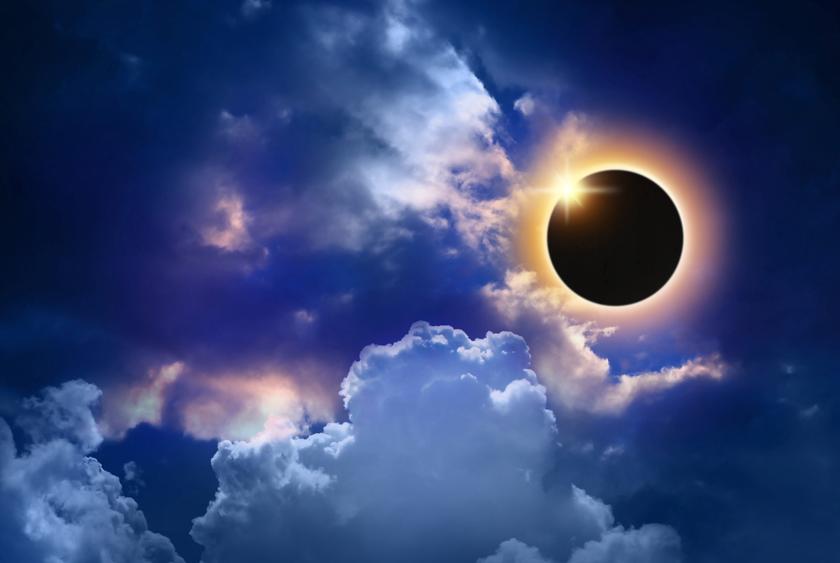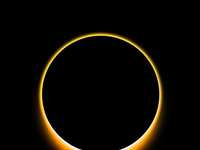How to Safely View the Solar Eclipse This Weekend

We're in for a treat this month: an annular solar eclipse will be visible to most of the U.S. on the morning of Saturday, October 14.
We Houstonians are just outside the "ring of fire" path, but we will still see a partial solar eclipse. Over the course of a few hours, the moon will pass in front of the sun, blocking more than 80% of it from our vantage point in Houston.
When the sun becomes obscured during a solar eclipse, broad daylight is replaced with an eerie twilight. For astronomy buffs, a solar eclipse is also a time to look at features of the sun that aren't normally visible, like the solar corona, chromosphere and more.
It's a visually stunning phenomenon that many of us will head outside to watch. That said, you should never look at the sun without proper protection — even when it's mostly eclipsed by the moon.
"An eclipse is an event no one should miss, but it can be dangerous," says Dr. Rahul Pandit, an ophthalmologist at Houston Methodist. "The sun's visible light will be blocked by the moon, which allows viewers a chance to actually stare at the sun. However, the other wavelengths of light, such as infrared rays, are still able to reach and burn the retina of the eyes. This can cause serious damage within minutes."
In fact, looking at the sun can permanently damage your retina — the layer of the eye that senses light and relays that information to the brain — and even lead to blindness in extreme cases.
Looking at the sun doesn't become any safer during a partial solar eclipse, which is why eye protection is key when planning to view a solar eclipse.
How to protect your vision while watching a solar eclipse
Enjoying a solar eclipse isn't as simple as going outside and looking up at the partially blocked sun, as this can damage your vision. And, no, even your most expensive pair of sunglasses won't help. You'll need some special supplies, and you'll also need to be sure you're using those supplies correctly.
Here are Dr. Pandit's tips for safely viewing a solar eclipse:
- Purchase ISO 12312-2 compliant eclipse glasses. These glasses contain solar filters that not only reduce visible sunlight to safe and comfortable levels but also block solar UV and IR radiation.
- Purchase a pair of ISO 12312-2 compliant solar binoculars. More expensive than eclipse glasses, but perhaps worth the investment if you also plan to watch the total solar eclipse headed our way on April 8, 2024. Solar eclipse binoculars start around $25.
- Equip binoculars and telescopes with ISO 12312-2 compliant solar filters. A solar filter must always be the first thing sunlight passes through. Never look at the sun through an unfiltered pair of binoculars or telescope — even if you're wearing eclipse glasses. The American Academy of Ophthalmology recommends talking with an expert astronomer if you plan to use a special solar filter on a camera, telescope, binoculars or any other optical device.
- Protect your eyes for the entirety of the eclipse. No matter how covered the sun becomes, you must wear eclipse glasses or use solar filters the entire time. Worth a second reminder: Never look at the sun through an unfiltered pair of binoculars or telescope — even if you're wearing eclipse glasses. A solar filter must always be the first thing sunlight passes through.
- Don't use damaged eclipse glasses or solar filters. If you're using supplies that have been stored in the back of a closet for the last several years, be sure to inspect the integrity of the solar filter before using them to watch an eclipse. If there are any scratches, tears or punctures, discard it.
- Don't let kids watch a solar eclipse alone. Parents should make sure children understand the risks of looking at the sun without solar protection and supervise them if they're using eclipse glasses.
"I'm looking forward to viewing this year's eclipse with my family, but it's important to ensure we're viewing it safely as well," adds Dr. Pandit.
You can check the American Astronomical Society's website or a list of suppliers of safe solar filters and viewers.
Katie McCallum

















